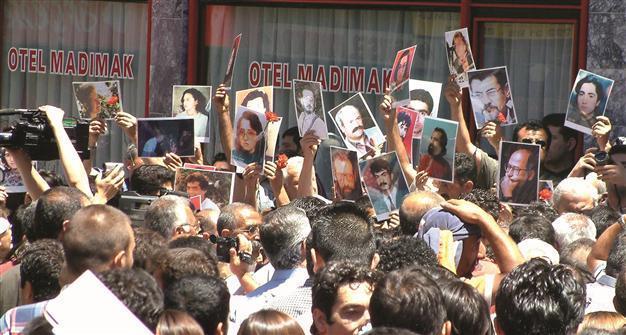Sivas massacre case should go on, victims and suspects say
Erdem Güneş ISTANBUL- Hürriyet Daily News

This file photo shows a protest condemning the massacre, in which 33 intellectuals as well as two hotel staff and two of the initiators of the fire died in 1993 in eastern province of Sivas. Hürriyet photo
An Ankara court is expected to close the 1993 Sivas massacre case due to a statute of limitations on March 13, but neither the defendants nor the prosecution want the trial to be dropped.Speaking on behalf of the families of the 33 victims, who were burned to death in a fire set by an Islamist mob during an Alevi cultural festival in the eastern province of Sivas, lawyer Şenal Sarıhan said even though the court is to drop the case due to the statute of limitations, they will continue to pursue their rights.
Muhammet Emin Özkan, a lawyer for suspect Muhsin Erbaş, also argued the case should not be dropped, for different reasons.
“The actual ones who burnt the hotel down and killed 37 people [33 intellectuals, two hotel staff and two protesters] should be discovered,” Özkan told the Hürriyet Daily News yesterday on the phone. A lawyer for the victims said the charges had been an attempt to destroy constitutional order at the time, but now they say it was a crime against humanity.
The victims were killed on July 2, 1993, when the Madımak Hotel in Sivas was torched. In 2008, after 15 years had passed, an Ankara prosecutor demanded the case be dropped since it had been filed on the charges of attempting to destroy constitutional order, which has a 15-year statute of limitations. Although 79 people have been sentenced to jail so far, six suspects in the case are still missing.
“If the case ends on March 13, we will appeal to a higher court, and if we cannot get a result again, this case will go to the ECHR [European Court of Human Rights] in the end,” Sarıhan told the Daily News. Sarıhan also argued the court should recognize the case as a crime against humanity, so it would not have a certain time limit.
Systematic discrimination
Meanwhile, Turkey’s Alevi Bektaşi Federation Chairman Selahattin Özel condemned the government for “backing the fugitives in the case by doing nothing to have them arrested” and said the government had a policy of systematic discrimination against Alevis.
“One of the suspects in the case, Cafer Erçakmak, was wanted worldwide by Interpol. But he died on July 10, 2011, in Sivas, where he had been living openly. They could have found him easily; they did not want to. The end of the Sivas massacre case will be proof of discrimination against Alevis,” Özel told the Daily News yesterday by phone.
Erçakmak had called on the crowd who burned the Madımak Hotel to lynch Aziz Nesin, a famous author, who narrowly escaped.
Minister of Customs and Trade Hayati Yazıcı also said on March 4 he hoped the court would not decide for a statute of limitations and the criminals would be punished. Yazıcı had served as a lawyer to one of the defendants.
















